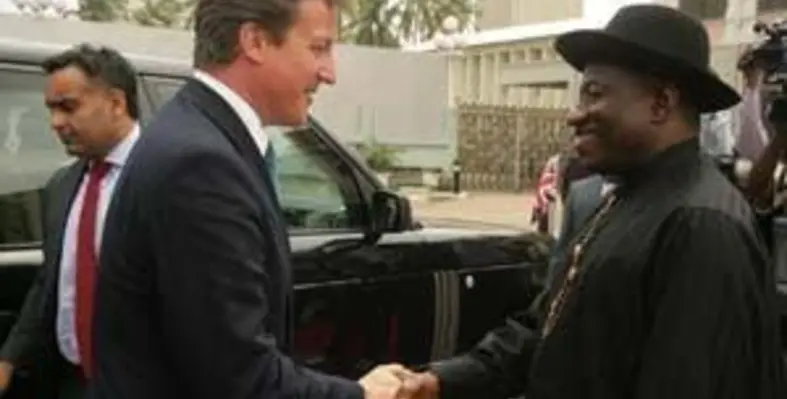As economic problems continue in Europe, the UK government views Nigeria as an ‘increasingly influential emerging power.’
Cameron’s visit was viewed as a clear endorsement of the closer partnership emerging between the two countries and the scope for increasing trade between them. The government of the UK views Nigeria as an ‘increasingly influential emerging power.’ Indeed, the British All Party Parliamentary Group (APPG) stated “the UK’s bilateral relationship with Nigeria is one of its most important in Africa”.
Nigeria is in fact the UK’s second largest export market in Africa and the African continent’s third largest importing nation into the UK.
The UK government can clearly see the huge potential for growth in Nigeria in the days ahead and wishes to ensure that its market share of trade with this ‘giant of Africa’ does not decline any further. It was the late President Yar’Adua who perhaps best summarised the view of Nigeria towards the UK when he spoke of the historical and cultural links and said “The UK is Nigeria’s preferred partner in development.”
The German Chancellor’s visit to Nigeria just a few days prior to that of David Cameron focused on increased cooperation in the development of gas processing in Nigeria. Germany is keen to reduce its dependence on gas supplies from Russia and sees Nigerian gas as an alternative source. Recent worldwide concerns over nuclear energy have served to sharpen Germany’s focus on the subject. However, Germany’s demands may conflict with the increasing need for gas in Nigeria to increase domestic power generation.
Growth and trade
Cameron’s agenda originally called for talks on trade and development, but the recent increase in violence from Boko Haram served to also bring to the talks discussions focused on intelligence and defence ties. Cameron was accompanied by Development Secretary Andrew Mitchell, Investment Minister Lord Green and a business delegation comprising 25 representatives of blue chip British companies.
In Lagos, David Cameron visited the Pan African University Business School and spoke about growth and trade opportunities. Whilst there, Cameron met with the Governor of Lagos State, Babatunde Fashola, and gave a glowing tribute to Governor Fashola’s accomplishments to date.
Passion and enterprise
Cameron stated “What I have seen in London, I have seen 100 fold here today. From Eko Atlantic City and Balogun Street Market to the biggest part in the most populous country in Africa, you are transforming your state. From the civil activism of the churches of South London to the contribution of Nigerians to British business, law, medicine, sport and music, I have seen the passion and enterprise of Nigerians changing my country for the better.”
Governor Fashola asked the British Prime Minister for a collaborative effort in encouraging Nigerian professionals in the Diaspora to look towards returning home to help with nation building.
Nigerians have for so many years waited patiently for the tide to turn for their country. Mocked by the international media where the very name ‘Nigeria’ came to stand for a basket of negative attributes, many may have given up hope of Africa’s giant ever awakening from its slumbers. After his recent election, Goodluck Jonathan predicted that Nigeria’s decade of development had begun. How heartening it was therefore to hear David Cameron say in a speech on 19th July:
“Tell me this: which part of the world has seen its number of democracies increase nearly eight-fold in just two decades? Eastern Europe? No, it’s Africa. Which continent has six of the ten fastest growing economies in the world? Asia? No, it’s Africa. Which country is predicted by some to have the highest average GDP growth in the world over the next 40 years? You might think Brazil, Russia, India or China. No. Think Africa. Think Nigeria.”














